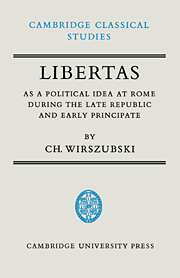Book contents
- Frontmatter
- Contents
- PROLEGOMENA
- CHAPTER 1 GENERAL CHARACTERISTICS OF LIBERTAS
- CHAPTER 2 CIVIL DISCORD: OPTIMATES AND POPULARES
- CHAPTER 3 THE DECLINE OF THE TRADITIONAL FORM OF GOVERNMENT
- CHAPTER 4 THE AUGUSTAN PRINCIPATE IN RELATION TO LIBERTAS
- CHAPTER 5 PRINCIPATUS ET LIBERTAS RES OLIM DISSOCIABILES
- Bibliography of works referred to
- Index
CHAPTER 5 - PRINCIPATUS ET LIBERTAS RES OLIM DISSOCIABILES
Published online by Cambridge University Press: 24 August 2009
- Frontmatter
- Contents
- PROLEGOMENA
- CHAPTER 1 GENERAL CHARACTERISTICS OF LIBERTAS
- CHAPTER 2 CIVIL DISCORD: OPTIMATES AND POPULARES
- CHAPTER 3 THE DECLINE OF THE TRADITIONAL FORM OF GOVERNMENT
- CHAPTER 4 THE AUGUSTAN PRINCIPATE IN RELATION TO LIBERTAS
- CHAPTER 5 PRINCIPATUS ET LIBERTAS RES OLIM DISSOCIABILES
- Bibliography of works referred to
- Index
Summary
Freedom of man under government is to have a standing rule to live by, common to every one of that society and made by the legislative power erected in it.
LOCKE, Two Treatises on Civil Government, ii, 4, 22.Liberty alone demands for its realisation the limitation of the public authority.
ACTON, ‘Nationalism’, in The History of Freedom, p. 288.THE NATURE OF THE PROBLEM
Lucan, writing the later part of his epic in defiance of Nero's tyranny, observed that ever since the battle of Pharsalus there had been afoot a conflict between liberty and Caesar, and Tacitus remarked that prior to Nerva the Principate and freedom were incompatible. It is a well-known fact that the Julio-Claudian and Flavian emperors had from time to time to face an opposition varying in form and intensity. After Caligula's assassination Libertas was the watchword of those who attempted to abolish the Principate; some of Nero's victims died with the name of Iuppiter Liberator on their lips; and after Nero's downfall Libertas Restituta became a popular slogan. It seems therefore that in some form or other freedom and the Principate clashed, and, in a way, Tacitus's historical writings, particularly the Annals, were perhaps conceived and executed as the story of that struggle.
But while the conflict between the Principate and libertas under the emperors from Tiberius to Domitian appears to have been a fact, it is by no means clear what was the nature of that conflict.
- Type
- Chapter
- Information
- Publisher: Cambridge University PressPrint publication year: 1950



